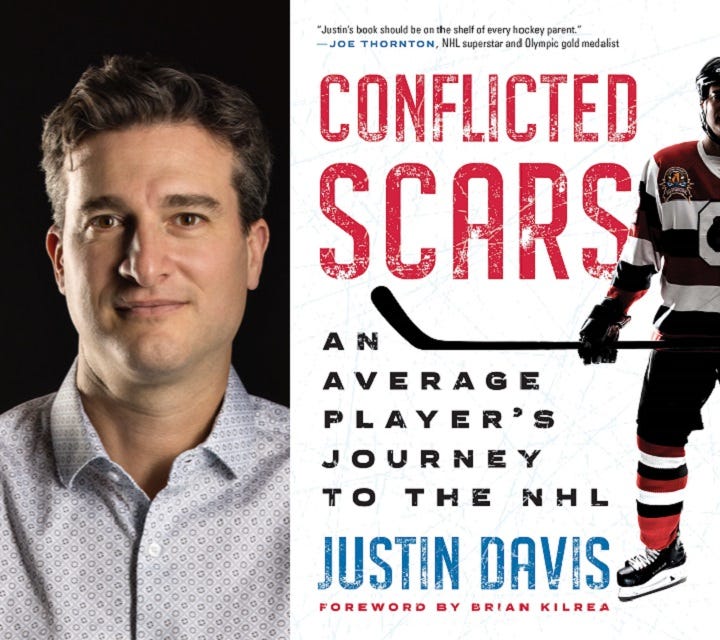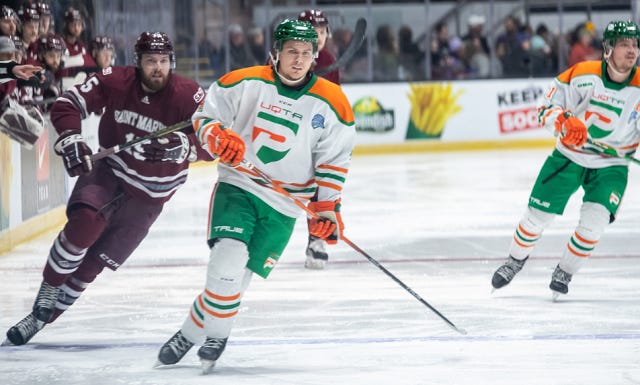Justin Davis on 'Conflicted Scars'; SportsLit S7E02 Listener's Guide
The new episode is more topical than one would have wished. Justin Davis, author and alumnus of the OHL and Canadian university hockey, joins Neil Acharya and me to discuss his engrossing memoir.
Talk about strange timing. The latest SportsLit episode with Justin Davis is that much more of a timely discussion — unfortunately since there it means there are more survivors of abuse who one can only imagine are shattered and have to pull themselves together, which can take years — since bullying, harassment, hazing, and maltreatment in the pro-format Canadian Hockey League is in the headlines.
This episode about Davis’s memoir, Conflicted Scars: An Average Player’s Journey To The NHL (ECW Press, October 2022), was recorded on 27 April. Cohost Neil Acharya and I also read every book cover-to-cover (or to the end of the PDF in some cases) before we speak with the guest. We try to be evergreen in our line of discussion, although it never hurts to have a time-stamp that lets listeners know that we ‘live in the now.’
Here is the episode. It should play with a press of the play button, but it is also available wherever you receive your favorite podcasts.
<iframe style="border-radius:12px" src="width="100%" height="352" frameBorder="0" allowfullscreen="" allow="autoplay; clipboard-write; encrypted-media; fullscreen; picture-in-picture" loading="lazy"></iframe>
Unwittingly, the episode with Davis dropped about 90 minutes before the Ontario (OHL) league announced sanctions against the Niagara IceDogs. The team’s captain and primary goaltender were banned from the league after a thorough third-party investigation concluded that they “participated in serious violations of the Player Maltreatment Policy and have violated the OHL Code of Conduct.” Team governor Darren DeDobbelaer, who presided over cellar-dwellers in three different leagues last season, is banned from being the team’s GM for two seasons. The IceDogs were also fined C$100,000 and forfeited a first-round choice in 2024.
As content and trigger warning (CW/TW), this episode does get into some heavy topics. If it affects you, please know that you are always supported and loved.
Justin Davis was impelled to build a writing project he initially intended to share with his children into Conflicted Scars: An Average Player’s Journey To The NHL (ECW Press, October 2022) after realizing some of the toxic aspects he bore the brunt of in the Ontario (OHL) league in the 1990s were still around in the 2020s. There were plenty of highs and friendships, plus a Memorial Cup victory with the Ottawa 67’s in 1999 to cap off his run in the league. But Davis found he readily related to the assessments, including the Turnpenney Report that the CHL commissioned, that document how the power structure of developmental hockey in Canada tends to desensitize children and teenagers.
Anyway, here is a follow-along that might provide background to the discussion.
Introduction
0:00-14:40
The episode was recorded on April 27. Early on, I mention Ciara McCormack. Earlier that week, the alumna of Canada’s national women’s soccer team was one of several sportspeople who told a House of Commons committee “that abuse is rampant in multiple sports (while) calling for a fundamental re-think of how elite sports are governed in Canada.”
Neil observes that the narrative is about Davis losing, and then “rediscovering his passion for hockey — but it’s not a blind passion.”
He was moved in back-to-back seasons by his first two OHL teams. He found his fit, eventually, under Hockey Hall of Fame coach Brian Kilrea in Ottawa, and had an excellent five-season run with the Western Mustangs of Ontario University Athletics. Davis helped Western win the University Cup in 2002 and remains the Mustangs’ all-time scoring leader.
The reference to “purple confetti” and “the closest the Kingston Frontenacs ever get to a ticker-tape parade” hearkens to our childhood experience going to games at the Memorial Centre. The barn only had a license to serve alcohol in a caged-in area under the stands called the Lion’s Den. Early in the third period, some fans who were well-lubed by a couple of OVs would enter the seating area to hear the winning 50/50 numbers. Then they would tear up the tickets and fling them aloft.
Interview
14:40-19:20: ‘The brain heals, but it’s the next bumps and bruises’
In the OHL, Davis was a year ahead of Steve Montador, the former NHL defenceman who died at age 35 in 2015. Montador was found to have chronic traumatic encephalopathy (CTE), the degenerative brain condition that doctors have noted is caused by brain injuries.1
The premature death of Montador led to Ken Dryden penning Game Change: The Life and Death of Steve Montador and the Future of Hockey, which was published in 2017.
19:20-28:00 ‘We need an adult to protect us from ourselves’
This portion covers safe sport and the demands on young athletes in the Canadian sport system.
“Fowler-Kennedy” is the renowned Fowler-Kennedy Sport Medicine Clinic in London, Ont., where he played at Western. In 2002, Davis had a first-degree shoulder separation when he played in the University Cup. The U-Cup involves playing three gruelling games in four days, and Davis needed three shots of anesthetic during the final when Western outlasted Trois-Rivières in triple overtime.
28:00-36:00 ‘We don’t need to hurt people, we don’t need to get them naked’
This section does touch on the toxic elements that still bubble up in the OHL, including hazing.
It is, here is hoping, touched with nuance instead of blanket critiquing. Davis notes there were OHL teams in his time that had zero tolerance for the ‘vets’ mistreating rookies. That included Brian Kilrea in Ottawa putting a stop to it a hazing ritual.
“Killer stopped it, punished the veterans and it never happened,” Davis says.
Things worked out well after that. Twenty-four years ago this month, Davis assisted on the Memorial Cup-winning overtime goal as Ottawa won on home ice.
36:00-42:20 ‘I got traded from Kingston in the middle of math class’
Part of the compensation for playing in the OHL, Québec, and Western leagues is one year of tuition and books at a post-secondary institution for each year playing. The OHL and WHL, though, allow teenage players to be traded anytime before the early-January deadline.
Here, Davis gives a reading about how chaotic that could be with changing high schools midway through the school year. Davis, these days, is a teacher at Orangeville District Secondary School.
Fun fact: the sports teams at the Ottawa high school Davis attended, Canterbury, are called the Mustangs. Foreshadowing!
42:20-46:00 The way forward
This section examines how hockey’s values — toughness, character, teamwork — need to be applied to standing up against bad behavior. There is a reference to Chicago NHL team’s sex-abuse scandal that survivor Kyle Beach blew the whistle on in 2021.
(Personal observation: the words OBLIGATION TO REPORT should be posted in every dressing room and locker room in North America.)
46:00-55:00 ‘It’s a great game, but it’s not affordable at this point’
Davis notes one theme he would have liked to go deeper on in Conflicted Scars is the price-point of youth hockey. He noted the messaging advising against children moving for youth hockey is mixed when “60 per cent” of the players chosen in the OHL priority selection are from the Greater Toronto Hockey League (GTHL).
The GTHL is the largest youth hockey league in the world. The chat with Justin Davis occurred two days after Rick Westhead, of TSN, published a report detailing that a GTHL organization was almost sold for C$375,000.
The OHL, on March 29, said it did not find evidence to confirm allegations of hockey parents paying five-figure sums to have their sons selected in the 2022 OHL priority selection draft.
The issue of the soaring cost of youth hockey has been touched on in our episodes with Rich Cohen and Sean Fitz-Gerald. Cohen linked up in 2021 to discuss Pee Wees: Confessions of a Hockey Parent (S5E02). Fitz-Gerald joined us in ’19 to discuss Before the Lights Go Out: A Season Inside a Game on The Brink (S3E03).
Sean, Rich, and Justin Davis all have our gratitude, and we always hope the experience was great for our guests.
Lastly, do you need a visual of the Université du Québec à Trois-Rivières Patriotes hockey uniforms? You might not be able to unsee it.
That is more than enough for now. Please stay safe, and be kind.
A personal policy is to say brain injuries and regard “concussions” as an euphemism.






